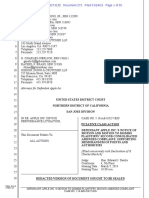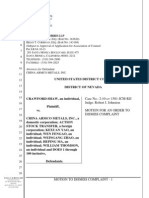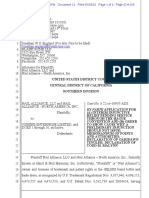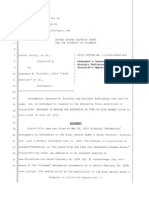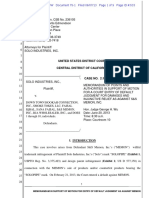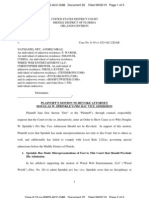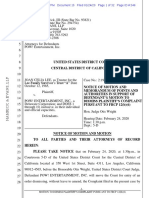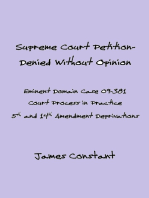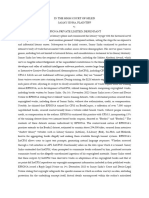Zynga's Motion To Strike
Zynga's Motion To Strike
Uploaded by
TechCrunchCopyright:
Available Formats
Zynga's Motion To Strike
Zynga's Motion To Strike
Uploaded by
TechCrunchOriginal Title
Copyright
Available Formats
Share this document
Did you find this document useful?
Is this content inappropriate?
Copyright:
Available Formats
Zynga's Motion To Strike
Zynga's Motion To Strike
Uploaded by
TechCrunchCopyright:
Available Formats
1 QUINN EMANUEL URQUHART & SULLIVAN, LLP
Claude M. Stern (Bar No. 96737)
2 claudestern@quinnemanuel.com
Karin Kramer (Bar No. 87346)
3 karinkramer@quinnemanuel.com
555 Twin Dolphin Drive, 5th Floor
4 Redwood Shores, California 94065-2139
Telephone: (650) 801-5000
5 Facsimile: (650) 801-5100
6 PAUL HASTINGS LLP
Bradford K. Newman (Bar No. 178902)
7 bradfordnewman@paulhastings.com
Peter C. Meier (Bar No. 179019)
8 petermeier@paulhastings.com
1117 S. California Avenue
9 Palo Alto, CA 94304-1106
Telephone: (650) 320-1800
10 Facsimile: (650) 320-1900
11 Attorneys for Defendant Zynga Inc.
12
13 UNITED STATES DISTRICT COURT
14 NORTHERN DISTRICT OF CALIFORNIA
15 SAN FRANCISCO DIVISION
16
17 ELECTRONIC ARTS, INC., CASE NO. 3:12-CV-04099-SI
18 Plaintiff, ZYNGA'S NOTICE OF MOTION AND
MOTION TO STRIKE; MEMORANDUM
19 vs. OF POINTS AND AUTHORITIES
20 ZYNGA INC., Date: December 21, 2012
Time: 9:00 a.m.
21 Defendant. Courtroom: Courtroom 10
22 Complaint Filed: August 3, 2012
23
24
25
26
27
28
03880.51975/4961402.2 Case No. 3:12-CV-04099-SI
ZYNGA'S MOTION TO STRIKE
1 NOTICE OF MOTION AND MOTION
2 TO THE CLERK OF THE ABOVE-ENTITLED COURT, PLAINTIFF, AND ITS ATTORNEYS
3 OF RECORD:
4 PLEASE TAKE NOTICE that on December 21, 2012, at 9:00 a.m. or as soon thereafter as
5 this matter may be heard, in Courtroom 10 of the above-entitled Court, located at 450 Golden Gate
6 Avenue, San Francisco, California 94102, before the Honorable Susan Illston, defendant Zynga
7 Inc. will, and hereby does, move the Court for an order striking, pursuant to Federal Rule of Civil
8 Procedure 12(f), the following allegations and exhibits from Plaintiff Electronic Art’s (“EA”)
9 Complaint because they constitute redundant, immaterial, impertinent and/or scandalous matter
10 that is unfairly prejudicial to Zynga:
11 1. Paragraph 4 and corresponding footnotes;
12 2. Paragraph 6 and corresponding footnotes;
13 3. Paragraph 32 (starting at page 9, line 5), and the copyright registrations included in
14 Exhibit A for The Sims, The Sims 2, The Sims 3, MySims, and The Sims Online
15 which are referenced in Paragraph 32;
16 4. Paragraph 33 through Paragraph 52 and corresponding footnotes; and
17 5. Paragraph 61 through Paragraph 62 and corresponding footnotes.
18 This motion is based on this Notice of Motion, the attached Memorandum of Points and
19 Authorities, the pleadings and documents on file in this case, and all other evidence and arguments
20 as may be presented at the hearing on the motion.
21
22 DATED: September 14, 2012 QUINN EMANUEL URQUHART &
SULLIVAN, LLP
23
24 PAUL HASTINGS LLP
25
26
By /s/ Claude M. Stern
27 Claude M. Stern
28 Attorneys for Defendant Zynga Inc.
03880.51975/4961402.2 Case No. 3:12-CV-04099-SI
-2-
ZYNGA'S MOTION TO STRIKE
1 MEMORANDUM OF POINTS AND AUTHORITIES
2 QUESTIONS PRESENTED
3 1. Should the Court strike allegations from the Complaint that quote from and cite to blogs
4 and internet publications that serve no purpose other than to try to portray Zynga in a bad
5 light, cannot be used to prove any element of plaintiff Electronic Arts Inc.’s (“EA”) claim,
6 and therefore have no bearing on EA’s single claim for relief?
7 2. Where plaintiff has alleged a single claim of copyright infringement involving one game,
8 should the Court strike allegations regarding accusations and unproven claims related to
9 other games, including games of third parties, that have no bearing on EA’s claim for
10 relief?
11 3. Where EA has alleged a single claim of copyright infringement involving one game,
12 should copyright registrations for other games that are attached as exhibits to the
13 Complaint be stricken so that there is no confusion about which works are at issue?
14 PRELIMINARY STATEMENT
15 EA has brought a single-claim complaint for alleged copyright infringement against
16 defendant Zynga Inc., raising one narrow issue: does Zynga’s game, The Ville, copy protectable
17 elements of EA’s game, The Sims Social? In sharp contrast to the confined inquiry that single
18 claim requires, EA’s Complaint is an unrestrained ramble of immaterial, inflammatory, and
19 prejudicial allegations that have no bearing on the issue at hand. These allegations are so patently
20 irrelevant to the case that they appear geared more towards inciting the press coverage they
21 generated than contributing to legal analysis. Zynga therefore moves to strike them.
22 The objectionable paragraphs of the Complaint comprise the following categories:
23 • Selectively quoted – and even anonymous – comments from the
blogosphere and internet publications whose sole apparent purpose is to
24 try to portray Zynga in a bad light;
25 • Allegations regarding other Zynga games that are not accused in this case;
26
• Allegations regarding disputed accusations and claims involving Zynga
27 and third parties which EA has no standing to assert and which have no
bearing on whether The Ville infringes The Sims Social;
28
03880.51975/4961402.2 Case No. 3:12-CV-04099-SI
ZYNGA'S MOTION TO STRIKE
1 • Extensive reference to an old EA game known as The Sims, which EA
does not accuse Zynga of infringing; and
2
• An exhibit made up of copyright registrations for other EA games that EA
3 has not put at issue in the Complaint.
4
5 Each of these categories meets the standard for a Federal Rule of Civil Procedure 12(f) motion to
6 strike. Together, they represent a smear campaign.
7 If these allegations are left in the Complaint, EA doubtless will claim they provide the
8 basis for discovery into the matters raised by those allegations – matters that have nothing to do
9 with its actual claim. The result will be discovery and evidentiary disputes that will burden the
10 Court and Zynga.
11 To avoid the confusion and prejudice these allegations will engender, and to spare the
12 Court and the parties the unnecessary expenditure of resources that inevitably will arise from
13 litigating disputes over extraneous matters, Zynga respectfully requests that the Court strike the
14 designated allegations.
15 LEGAL STANDARD
16 A party may move to strike any “insufficient defense or any redundant, immaterial,
17 impertinent, or scandalous matter.” Fed. R. Civ. P. 12(f); see also Whittlestone, Inc. v. Handi-
18 Craft Co., 618 F.3d 970, 973-74 (9th Cir. 2010) (Rule 12(f) authorizes district court to strike
19 “insufficient defense or any redundant, immaterial, impertinent, or scandalous matter”). “The
20 function of a 12(f) motion to strike is to avoid the expenditure of time and money that must arise
21 from litigating spurious issues by dispensing with those issues prior to trial.” Fantasy, Inc. v.
22 Fogerty, 984 F.2d 1524, 1527 (9th Cir. 1993) [Fogerty], rev’d on other grounds by Fogerty v.
23 Fantasy, Inc., 510 U.S. 517 (1994). Although “[m]otions to strike are generally regarded with
24 disfavor,” Greenwich Ins. Co. v. Rodgers, 729 F. Supp. 2d 1158, 1162 (C.D. Cal. 2010), the
25 decision as to whether to strike material from the pleadings is vested in the discretion of the
26 district court, see Nurse v. United States, 226 F.3d 996, 1000 (9th Cir. 2000) (appellate review of
27 12(f) decision uses abuse of discretion standard).
28
03880.51975/4961402.2 Case No. 3:12-CV-04099-SI
-2-
ZYNGA'S MOTION TO STRIKE
1 The four types of material suitable for disposition by a Rule 12(f) motion are defined as
2 follows:
3 • Immaterial matter “is that which has no essential or important relationship
to the claim for relief or the defenses being pleaded.” Cal. Dep’t of Toxic
4 Substances Control v. Alco Pac., Inc., 217 F. Supp. 2d 1028, 1032 (C.D.
Cal. 2002).
5
6 • “Redundant allegations are those that are needlessly repetitive or wholly
foreign to the issues involved in the action.” Id.
7
• “Impertinent matter consists of statements that do not pertain, and are not
8 necessary, to the issues in question.” Fogerty, 984 F.2d at 1527.
9 • “[S]candalous matters are allegations that unnecessarily reflect [] on the
moral character of an individual or state [] anything in repulsive language
10 that detracts from the dignity of the court, and include [] allegations that
11 cast a cruelly derogatory light on a party or other person.” Consumer
Solutions REO, LLC v. Hillery, 658 F. Supp. 2d 1002, 1020 (N.D. Cal.
12 2009) (internal quotation marks omitted).
13 A motion to strike should be granted when “the matter to be stricken clearly could have no
14 possible bearing on the subject of the litigation.” Spencer v. DHI Mortg. Co., Ltd., 642 F. Supp.
15 2d 1143, 1168 (E.D. Cal. 2009).
16 LEGAL STANDARD FOR COPYRIGHT
17 The application of Rule 12(f) to a claim of copyright infringement requires measuring the
18 immateriality and impertinence of the challenged allegations against the elements of a copyright
19 claim. Survivor Prods. LLC v. Fox Broad. Co., No CV01-3234 LGB (SHX), 2001 WL 35829267,
20 at *3 (C.D. Cal. 2001). To prove a claim of copyright infringement, EA will need to prove that it
21 owns a copyrightable work and that Zynga inappropriately copied that work’s protected elements.
22 See Rice v. Fox Broad. Co., 330 F.3d 1170, 1174 (9th Cir. 2003). Proof of copying requires proof
23 of substantial similarity of protectable elements of the works at issue. See id. To have a “possible
24 bearing” on this case, the allegations in the Complaint must be germane to those issues.
25
26
27
28
03880.51975/4961402.2 Case No. 3:12-CV-04099-SI
-3-
ZYNGA'S MOTION TO STRIKE
1 ARGUMENT
2 I. THE STATEMENTS FROM THE INTERNET AND BLOGOSHPHERE SHOULD
BE STRICKEN BECAUSE THEY HAVE NO BEARING ON THIS ACTION AND
3 ARE PREJUDICIAL1
4 Assertions of substantial similarity made in the media are irrelevant and unfairly
5 prejudicial to claims of copyright infringement. See, e.g., Positive Black Talk, Inc. v. Cash Money
6 Records, Inc., 394 F.3d 357, 378 (5th Cir. 2004) (affirming exclusion of newspaper articles
7 offered as alleged proof that audience members believed the two works were substantially
8 similar), overruled on other grounds by Reed Elsevier, Inc. v. Muchnick, 130 S. Ct. 1237, 1243
9 (2010); Crane v. Poetic Prods., Ltd., 593 F. Supp. 2d 585, 597 (S.D.N.Y. 2009) (opinions of third
10 parties in secondary materials are irrelevant to determination of substantial similarity). Because
11 such media comments are immaterial to resolution of a copyright claim, they should be stricken.
12 Survivor Prods., 2001 WL 35829267, at *3-4 (opinions of similarity in trade publications and
13 newspapers stricken as immaterial to copyright infringement); RDF Media Ltd. v. Fox Broad.
14 Co., 372 F. Supp. 2d 556, 567 (C.D. Cal. 2005) (striking media quotes that one television program
15 was a “rip off” of a prior program because such quotes “are legally irrelevant to the issue of
16 substantial similarity”).
17 In Survivor Productions, the court granted a motion to strike media quotations which were
18 closely analogous to those proffered by EA here. The producers and broadcasters of the Survivor
19 television series alleged that the television series Boot Camp infringed the copyright in Survivor.
20 The complaint included “extensive quotations from various entertainment industry trade
21 publications and newspapers, which describe[d] the two programs and detail[ed] the purported
22 similarities between them.” 2001 WL 35829267, at *1. The plaintiffs also attached to the
23 complaint articles that described Boot Camp as “a ‘ripoff’ of Survivor.” Id. The District Court
24 struck the articles from the record, because they “amount to nothing more than a post-hoc analysis
25 of similarities between the programs by news reporters, unguided by the legal standards that
26
1
27 This argument pertains to the following paragraphs of the Complaint: 4, 6, 33-34, 37-40,
43-44, 45, 46, 47, 48, 49, 61, 62.
28
03880.51975/4961402.2 Case No. 3:12-CV-04099-SI
-4-
ZYNGA'S MOTION TO STRIKE
1 govern the comparison of the two works under copyright law.” Id. at *3-4. The court further
2 acknowledged the prejudice that inheres in permitting such materials to remain in a complaint: “it
3 lends artificial credence to the opinions contained in the articles, and gives the appearance that
4 such opinions are legally relevant to the dispute.” Id. at *4.
5 Numerous paragraphs of EA’s Complaint contain the same kind of unguided and
6 prejudicial post hoc “analysis” courts have found objectionable in cases like Survivor Productions.
7 The internet and blogosphere comments that liberally populate EA’s Complaint are nothing more
8 than armchair opinions about copying, including alleged quotations from unknown sources.2 In
9 one trenchant example, EA quotes from an internet article where an anonymous, purported ex-
10 employee relays an alleged conversation in which Zynga’s CEO told him and others to copy their
11 competitors. (Compl. ¶ 44.) Besides being anonymous, the allegedly quoted statement occurred
12 long before The Sims Social was launched. Even if true, a statement made before both games at
13 issue existed could not possibly be probative of whether those games are substantially similar. See
14 Santrayll v. Burrell, No. 91 Civ. 3166, 1998 WL 24375, at *3 (S.D.N.Y. Jan. 22, 1998) (evidence
15 that musical artist copied in his prior works has no relevance to whether he copied from plaintiffs).
16 It also should be noted that at least some of the material EA has chosen to rely on has been
17 unfairly edited. The quotations lifted for the Complaint omit the positive statements about Zynga
18 contained in the articles, and at least one is misquoted. For example, in paragraph 61, which
19 contains a quotation stating that “The Ville crib[s] heavily from” The Sims Social, EA leaves out
20 an important part of the sentence. Intact, the sentence reads: “With their new game, The Ville,
21 Zynga is returning to the Yoville idea, . . .” – YoVille being a Zynga game that predated The Sims
22 Social by three years. The article goes on to point out how The Ville is like other Zynga games:
23 “Home-construction is where things take on that familiar ‘Zynga Vibe’–you'll
be able to lay out your house however you want. You’ll want to make it look
24 nice for yourself, but you'll especially want to make it look nice so that your
25
26 2
Because the allegations are in many cases inflammatory, Zynga has refrained from
27 repeating them in this brief. However, attached as Exhibit A is a highlighted copy of the
Complaint that takes the Court to the statements in question.
28
03880.51975/4961402.2 Case No. 3:12-CV-04099-SI
-5-
ZYNGA'S MOTION TO STRIKE
1 friends will be impressed. The in-game economy works the same as in other
Zynga games–activities pay you in happiness but cost you energy . . .”
2
What possible purpose could any of these random comments by lay writers, bloggers, and
3
people in the shadows serve in a lawsuit where careful analysis will be required by a jury?
4
Positive, negative, or agnostic, this internet and blogosphere commentary has no relation
5
whatsoever to the only questions put in issue by the claim: whether EA owns a copyrighted work;
6
and whether Zynga copied protectable elements of it. With no relevance to the underlying action,
7
and “no possible bearing” on this action, these gratuitous paragraphs of EA’s Complaint have no
8
place in a federal court pleading and should be stricken.
9
II. ALLEGATIONS REGARDING OTHER GAMES SHOULD BE STRICKEN
10 BECAUSE THEY CREATE CONFUSION, ARE PREJUDICIAL, AND ARE
IMMATERIAL TO WHETHER THE TWO GAMES AT ISSUE ARE
11 SUBSTANTIALLY SIMILAR3
12 A. EA’s Allegations Concerning Games Of Third Parties Have No Probative Value
13 But Are Likely To Create Confusion About What Is At Issue
14 EA spends much time discussing other accusations of copying against Zynga by itself and
15 third parties. (See, e.g., Compl. ¶¶ 33-52.) These accusations are disputed and unproven. They
16 are the kind of allegations that are rife within the game industry. None of these allegations is
17 relevant to the confined claim that EA actually has brought. Allegations regarding unproven
18 accusations, unrelated prior lawsuits, and other products are immaterial and impertinent within the
19 meaning of Rule 12(f) and should be stricken. McKinney v. Bayer Corp., No. 10–CV–224, 2010
20 WL 2756915, at *1-2 (N.D. Ohio July 12, 2010).
21 McKinney was a class action challenging Bayer’s advertising of certain vitamins. Bayer
22 moved to strike a paragraph in the complaint that referenced other products and litigation, and the
23 court granted the motion. Because those products and lawsuits did not relate to the product at
24 issue, they were “immaterial” and “gratuitous:”
25
26
3
27 This argument relates to the following paragraphs of the Complaint: 35-36, 37-40, 41, 42,
43-44, 47, 50-51, 52.
28
03880.51975/4961402.2 Case No. 3:12-CV-04099-SI
-6-
ZYNGA'S MOTION TO STRIKE
1 Plaintiff's allegations regarding Bayer's other products and past settlements
have no apparent relation to the claims asserted in this case, particularly since
2 none of the allegations in Paragraph 56 relate to the Vitamin Products at issue
here. These statements are unnecessary to the assertions in the Complaint,
3
neither setting forth an element of a claim made, nor providing the needed
4 factual predicate for one. In short, the assertions appear gratuitous at this
stage of the proceedings. Accordingly, the Court finds that Paragraph 56 is
5 immaterial and scandalous and should be stricken.
6 Id. at *2.
7 The same analysis applies here. EA’s Complaint contains references to accusations
8 regarding games owned by third parties – accusations that EA has no standing to make. For
9 example, in paragraph 47, EA alleges that companies known as Nimblebit and Buffalo Studios
10 “publicly accused” and “alleged” that Zynga copied their games. EA does not aver that it has any
11 relationship to those companies or their games, or that those “accusations” and “allegations” were
12 ever proven – or that either company even brought a formal claim with respect to them, let alone
13 that Zynga was adjudicated to be in the wrong. Saying something in public does not make it true.
14 EA caps off its paragraph with screenshots from those parties’ games and Zynga’s games from the
15 same genres, apparently to demonstrate their similarity. But EA knows very well that such a
16 gerrymandered comparison is distorting and that a more illuminating graphic would show all of
17 the games in each genre, thus revealing the naked-eye similarity common among games of the
18 same subject matter.
19 Moreover, the details of those extraneous allegations show just how useless they would be
20 to a determination of any issue in this case. For example, EA refers to two purported claims of
21 infringement by other parties, but does not – and cannot – allege that Zynga ever has been held by
22 a court to have infringed anything. Other of the allegations are EA’s representations about what
23 certain members of the “gaming press” reported, and still others are merely EA’s own conclusions
24 that some Zynga title “closely resembled” or “was a clone of” a third party’s game. (See, e.g.,
25 Compl. ¶¶ 38, 41.) None of this will assist the trier of fact with the precise legal analysis that will
26 be required in this case about two specific games. To the contrary, inasmuch as Zynga disputes
27 every one of those extraneous allegations, this single claim lawsuit would devolve into a labyrinth
28 of trials within trials. If allowed to be part of this litigation, those allegations would overwhelm
03880.51975/4961402.2 Case No. 3:12-CV-04099-SI
-7-
ZYNGA'S MOTION TO STRIKE
1 the only legitimate comparison to be made (The Ville vs. The Sims Social), would vastly and
2 improperly expand this litigation, and would ultimately confuse a jury.
3 To illustrate how pointless these gratuitous references are, even in the press that EA
4 obviously combed through to find the most derogatory statements it could about Zynga, there is
5 debate about the legitimacy of complaints that the game companies level at each other, including
6 those leveled at Zynga. For example, the article cited in paragraph 39 of the Complaint points out
7 that these games exist within a “circle of imitation”:
8 “Visually, the game [Zynga’s Farmville] does look good, but it looks rather
familiar, using the same art style of [Slashkey’s] Farm Town. However,
9 Farm Town uses a style awfully close to Zynga’s YoVille, so the circle of
imitation goes full circle it seems.”
10
11 These allegations by EA cannot even leave the starting gate to enter the path to admissibility. The
12 only purpose they serve is to try to create bias against Zynga, a purpose that is eschewed by Rule
13 12(f).
14 B. EA’s Allegations Regarding Its Other Game Are Also Immaterial4
15 EA makes liberal reference to its much older game, The Sims, and attaches as an exhibit to
16 its Complaint six copyright registrations related to versions of that game. But EA is not accusing
17 Zynga of infringing The Sims, and its dominating presence in the Complaint is pointless. In the 52
18 paragraphs leading up to where EA finally begins to set forth allegations that bear on issues related
19 to the claim it has alleged, The Sims is mentioned repeatedly. (See, e.g., Compl. ¶¶ 1, 2, 3, 6, 15,
20 and so on.) The extraneous registration certificates add nothing to the case, but do serve to cause
21 some confusion about EA’s intentions. They, too, and the paragraph containing them, should be
22 stricken.
23
24
25
26
27
4
This argument pertains to the following paragraphs in the Complaint: 32, 50-51.
28
03880.51975/4961402.2 Case No. 3:12-CV-04099-SI
-8-
ZYNGA'S MOTION TO STRIKE
1 CONCLUSION
2 For the foregoing reasons, Zynga respectfully requests that its motion be granted in its
3 entirety and that the offending paragraphs and portions of Exhibit A be stricken from the
4 Complaint.
6 DATED: September 14, 2012 QUINN EMANUEL URQUHART &
SULLIVAN, LLP
7
PAUL HASTINGS LLP
8
10
By /s/ Claude M. Stern
11 Claude M. Stern
Attorneys for Defendant Zynga Inc.
12
13
14
15
16
17
18
19
20
21
22
23
24
25
26
27
28
03880.51975/4961402.2 Case No. 3:12-CV-04099-SI
-9-
ZYNGA'S MOTION TO STRIKE
1 ECF ATTESTATION
2 I, Timothy A. Butler, am the ECF User whose ID and Password are being used to file this:
3 ZYNGA’S NOTICE OF MOTION AND MOTION TO STRIKE; MEMORANDUM OF
4 POINTS AND AUTHORITIES; [PROPOSED] ORDER. In compliance with Civil Local Rule
5 5-1(i)(3), I hereby attest that Claude M. Stern has concurred in this filing.
7 Dated: September 14, 2012 QUINN EMANUEL URQUHART &
SULLIVAN, LLP
8
9
By: /s/ Timothy A. Butler
10
11
12
13
14
15
16
17
18
19
20
21
22
23
24
25
26
27
28
03880.51975/4961402.2 Case No. 3:12-CV-04099-SI
ZYNGA'S MOTION TO STRIKE
You might also like
- Roblox LawsuitDocument56 pagesRoblox LawsuitTechCrunch67% (3)
- Tesla ComplaintDocument22 pagesTesla ComplaintTechCrunchNo ratings yet
- Defendants' Motion To DismissDocument37 pagesDefendants' Motion To Dismissjeff_roberts881100% (4)
- Twitter Class Action Lawsuit Over Mass LayoffsDocument10 pagesTwitter Class Action Lawsuit Over Mass LayoffsTechCrunchNo ratings yet
- Richard Barron Deposition 13066715 0 69905Document206 pagesRichard Barron Deposition 13066715 0 69905Paul Wall100% (1)
- Case 5:22-cv-07069Document20 pagesCase 5:22-cv-07069TechCrunchNo ratings yet
- Miramax v. TarantinoDocument29 pagesMiramax v. TarantinoTHROnlineNo ratings yet
- Apple Filing To Dismiss Iphone Slowdown SuitDocument50 pagesApple Filing To Dismiss Iphone Slowdown SuitMike WuertheleNo ratings yet
- Faulkner RequiemDocument17 pagesFaulkner RequiemKeith PearsonNo ratings yet
- Hicks V Netflix - Motion To StrikeDocument9 pagesHicks V Netflix - Motion To StrikeTHROnline100% (1)
- Motion To Dismiss - Final Electronic Signature-2Document14 pagesMotion To Dismiss - Final Electronic Signature-2stockdetective2006No ratings yet
- 20-10-02 Epic Games Motion For Judgment On The Pleadings (Apple Counterclaims)Document22 pages20-10-02 Epic Games Motion For Judgment On The Pleadings (Apple Counterclaims)Florian MuellerNo ratings yet
- HumanCentric Ventures v. Xiao - ComplaintDocument38 pagesHumanCentric Ventures v. Xiao - ComplaintSarah BursteinNo ratings yet
- 19-08-30 Avanci Et Al. Motion To Dismiss Continental ComplaintDocument46 pages19-08-30 Avanci Et Al. Motion To Dismiss Continental ComplaintFlorian MuellerNo ratings yet
- Epic Games v. Apple StatementDocument3 pagesEpic Games v. Apple StatementMikey Campbell100% (1)
- Viacom GameDocument28 pagesViacom GameEriq Gardner100% (1)
- Drummond v. Collingsworth - Terry Collingsworth Deposition Day 1Document259 pagesDrummond v. Collingsworth - Terry Collingsworth Deposition Day 1PaulWolfNo ratings yet
- Tesla Lawsuit Rivian ResponseDocument20 pagesTesla Lawsuit Rivian ResponseSimon Alvarez100% (1)
- How To Plead Abuse of Process - ArgumentsDocument19 pagesHow To Plead Abuse of Process - Argumentsjohngault80% (5)
- Nail Alliance v. Vishine - Motion For TRODocument193 pagesNail Alliance v. Vishine - Motion For TROSarah BursteinNo ratings yet
- (20-22398 54) Defendants' Notice of Filing Hearing Transcript On Plaintiffs' Motion For Issuance of Writ of Possession DE 601Document22 pages(20-22398 54) Defendants' Notice of Filing Hearing Transcript On Plaintiffs' Motion For Issuance of Writ of Possession DE 601lschneider68No ratings yet
- ICM Demurrer To WGA ComplaintDocument23 pagesICM Demurrer To WGA ComplaintTHR100% (1)
- Zindel V Fox Searchlight MTDDocument32 pagesZindel V Fox Searchlight MTDTHROnlineNo ratings yet
- Xped v. Exhibit 1 2022-01-20 TranscriptDocument25 pagesXped v. Exhibit 1 2022-01-20 TranscriptsqfreakNo ratings yet
- 20-09-15 Jay Srinivasan Declaration ISO Apple's Opposition To Epic Games' PI MotionDocument5 pages20-09-15 Jay Srinivasan Declaration ISO Apple's Opposition To Epic Games' PI MotionFlorian MuellerNo ratings yet
- Triller Lawsuit h3 PodcastDocument21 pagesTriller Lawsuit h3 PodcastHeel By NatureNo ratings yet
- Moritz V Universal Motion To Compel ArbitrationDocument20 pagesMoritz V Universal Motion To Compel ArbitrationTHROnline100% (1)
- PUMA v. Forever 21 - Motion To DismissDocument66 pagesPUMA v. Forever 21 - Motion To DismissSarah Burstein100% (1)
- McGowan V Weinstein - Bloom MTDDocument36 pagesMcGowan V Weinstein - Bloom MTDTHROnlineNo ratings yet
- Twitch v. Does Ex Parte FilingDocument18 pagesTwitch v. Does Ex Parte FilingRussell BrandomNo ratings yet
- Sugarfina v. Bouquet Bar - Motion To DismissDocument106 pagesSugarfina v. Bouquet Bar - Motion To DismissSarah BursteinNo ratings yet
- 00477-rjn Opp ADocument9 pages00477-rjn Opp AlegalmattersNo ratings yet
- Response To Opposition 2Document22 pagesResponse To Opposition 2meesh6927341No ratings yet
- Quatro Order Shortening TimeDocument4 pagesQuatro Order Shortening TimePicon Press Media LLCNo ratings yet
- Solo Industries v. Down Town Hookah - DJ MotionDocument9 pagesSolo Industries v. Down Town Hookah - DJ MotionSarah BursteinNo ratings yet
- Motion To Pull Pro HacDocument5 pagesMotion To Pull Pro HacsouthfllawyersNo ratings yet
- Uber MotionDocument13 pagesUber MotionGizmodo EditNo ratings yet
- Gartner Motion To DismissDocument30 pagesGartner Motion To DismissMichael KrigsmanNo ratings yet
- Sandvik Intellectual Property v. Kimball Equip. - ComplaintDocument37 pagesSandvik Intellectual Property v. Kimball Equip. - ComplaintSarah BursteinNo ratings yet
- Kleiman v. Wright Hearing TranscriptDocument17 pagesKleiman v. Wright Hearing TranscriptAnonymous BeYVZZYL6ANo ratings yet
- Snap LawsuitDocument72 pagesSnap LawsuitLaw&CrimeNo ratings yet
- Estate of Robert Graham, Chuck Close, Laddie John Dill Et Al. v. Sotheby's Inc. (C.D. Cal.) (Motion To Dismiss, Filed 1-12-12)Document65 pagesEstate of Robert Graham, Chuck Close, Laddie John Dill Et Al. v. Sotheby's Inc. (C.D. Cal.) (Motion To Dismiss, Filed 1-12-12)Charles E. ColmanNo ratings yet
- Niantic v. Global++ - Mot. For PIDocument28 pagesNiantic v. Global++ - Mot. For PIGrahamNo ratings yet
- Lee V POW MTDDocument32 pagesLee V POW MTDTHROnlineNo ratings yet
- Ex ParteDocument13 pagesEx PartebrancronNo ratings yet
- Twitter Request Dismiss of Discrimination LawsuitDocument34 pagesTwitter Request Dismiss of Discrimination LawsuitGizmodo EditNo ratings yet
- Auction Houses' Reply To Resale Royalties LawsuitDocument65 pagesAuction Houses' Reply To Resale Royalties LawsuitLee Rosenbaum, CultureGrrlNo ratings yet
- Soundgarden v. Cornell Stipulation To Withdraw ClaimsDocument5 pagesSoundgarden v. Cornell Stipulation To Withdraw ClaimsTHROnlineNo ratings yet
- Hicks V Netflix MTDDocument9 pagesHicks V Netflix MTDTHROnlineNo ratings yet
- 21-02-22 Epic Games v. Apple Joint Case Management StatementDocument10 pages21-02-22 Epic Games v. Apple Joint Case Management StatementFlorian Mueller100% (1)
- 20-10-02 Epic v. Google Joint Case Management StatementDocument22 pages20-10-02 Epic v. Google Joint Case Management StatementFlorian MuellerNo ratings yet
- ES Distribution v. 99 Cents Only - ComplaintDocument34 pagesES Distribution v. 99 Cents Only - ComplaintSarah BursteinNo ratings yet
- Statement of Decision WritDocument96 pagesStatement of Decision WritsaldannaNo ratings yet
- Blizzard Entertainment vs. Joyfun Inc/Sina GamesDocument23 pagesBlizzard Entertainment vs. Joyfun Inc/Sina GamesPolygondotcomNo ratings yet
- Supreme Court Eminent Domain Case 09-381 Denied Without OpinionFrom EverandSupreme Court Eminent Domain Case 09-381 Denied Without OpinionNo ratings yet
- Petition for Certiorari – Patent Case 99-396 - Federal Rule of Civil Procedure 12(h)(3) Patent Assignment Statute 35 USC 261From EverandPetition for Certiorari – Patent Case 99-396 - Federal Rule of Civil Procedure 12(h)(3) Patent Assignment Statute 35 USC 261No ratings yet
- Petition for Extraordinary Writ Denied Without Opinion– Patent Case 94-1257From EverandPetition for Extraordinary Writ Denied Without Opinion– Patent Case 94-1257No ratings yet
- Petition for Certiorari: Denied Without Opinion Patent Case 93-1413From EverandPetition for Certiorari: Denied Without Opinion Patent Case 93-1413No ratings yet
- Petition for Certiorari Denied Without Opinion: Patent Case 96-1178From EverandPetition for Certiorari Denied Without Opinion: Patent Case 96-1178No ratings yet
- Petition for Certiorari Denied Without Opinion: Patent Case 93-1518From EverandPetition for Certiorari Denied Without Opinion: Patent Case 93-1518No ratings yet
- Petition for Certiorari Denied Without Opinion: Patent Case 98-1972.From EverandPetition for Certiorari Denied Without Opinion: Patent Case 98-1972.No ratings yet
- An Appeal to the U.S Supreme Court & A Proposal to Our PresidentFrom EverandAn Appeal to the U.S Supreme Court & A Proposal to Our PresidentNo ratings yet
- Petition for Certiorari – Patent Case 94-782 - Federal Rule of Civil Procedure 12(h)(3) - Patent Statute 35 USC 261 – Judgment lien Statute 12 USC 1963From EverandPetition for Certiorari – Patent Case 94-782 - Federal Rule of Civil Procedure 12(h)(3) - Patent Statute 35 USC 261 – Judgment lien Statute 12 USC 1963Rating: 5 out of 5 stars5/5 (2)
- U.S. v. Sun Myung Moon 718 F.2d 1210 (1983)From EverandU.S. v. Sun Myung Moon 718 F.2d 1210 (1983)No ratings yet
- US DOJ Antitrust Lawsuit v. Google On Digital AdsDocument153 pagesUS DOJ Antitrust Lawsuit v. Google On Digital AdsTechCrunchNo ratings yet
- Snapchat Fentanyl CaseDocument34 pagesSnapchat Fentanyl CaseTechCrunchNo ratings yet
- Epic Supreme Court PetitionDocument488 pagesEpic Supreme Court PetitionTechCrunchNo ratings yet
- Class-Action Lawsuit Filed On Behalf of FTX InvestorsDocument56 pagesClass-Action Lawsuit Filed On Behalf of FTX InvestorsTechCrunchNo ratings yet
- Coalition For Independent Technology Research v. AbbottDocument24 pagesCoalition For Independent Technology Research v. AbbottTechCrunchNo ratings yet
- Defendants and Counterclaim-Plaintiffs' Motion To Stay Pending Closing of The TransactionDocument15 pagesDefendants and Counterclaim-Plaintiffs' Motion To Stay Pending Closing of The TransactionTechCrunch0% (2)
- REVERE Ratings - Lantern VenturesDocument24 pagesREVERE Ratings - Lantern VenturesTechCrunchNo ratings yet
- DKT 373 - 2022.11.10 - Google Chat DeletionsDocument14 pagesDKT 373 - 2022.11.10 - Google Chat DeletionsTechCrunchNo ratings yet
- Meta Motion To DismissDocument27 pagesMeta Motion To DismissTechCrunchNo ratings yet
- Justice Dept v. GoogleDocument153 pagesJustice Dept v. GoogleTechCrunchNo ratings yet
- Letter Addressing The Parties' Dispute Concerning Search ProtocolDocument6 pagesLetter Addressing The Parties' Dispute Concerning Search ProtocolTechCrunchNo ratings yet
- Twitter - Letter Decision Resolving Plaintiff's Seventh Discovery RequestDocument12 pagesTwitter - Letter Decision Resolving Plaintiff's Seventh Discovery RequestTechCrunchNo ratings yet
- Spiro AffidavitDocument4 pagesSpiro AffidavitTechCrunchNo ratings yet
- ICONIC HEARTS HOLDINGS, INC. vs. RAJ VIR NGL LABS LLC and DOES 1 Through 50, InclusiveDocument24 pagesICONIC HEARTS HOLDINGS, INC. vs. RAJ VIR NGL LABS LLC and DOES 1 Through 50, InclusiveTechCrunchNo ratings yet
- Twitter Musk LawsuitDocument62 pagesTwitter Musk LawsuitTechCrunchNo ratings yet
- California Age-Appropriate Design Code ActDocument14 pagesCalifornia Age-Appropriate Design Code ActTechCrunchNo ratings yet
- Hagens Berman Antitrust Class-Action Lawsuit Against Apple's App Store FeesDocument251 pagesHagens Berman Antitrust Class-Action Lawsuit Against Apple's App Store FeesTechCrunchNo ratings yet
- TikTok Response To Sen Blackburn Et Al June 30Document8 pagesTikTok Response To Sen Blackburn Et Al June 30TechCrunchNo ratings yet
- House Financial Services Committee Report On RobinhoodDocument138 pagesHouse Financial Services Committee Report On RobinhoodTechCrunchNo ratings yet
- House Oversight LetterDocument6 pagesHouse Oversight LetterTechCrunchNo ratings yet
- D.C. Attorney General's Office Lawsuit Against Grubhub, March 2022Document56 pagesD.C. Attorney General's Office Lawsuit Against Grubhub, March 2022TechCrunchNo ratings yet
- Elon Musk Notice To Terminate Twitter AcquisitionDocument8 pagesElon Musk Notice To Terminate Twitter AcquisitionTechCrunch100% (1)
- Trump v. Twitter, 3:21-cv-08378, U.S. District Court, Northern District of CaliforniaDocument17 pagesTrump v. Twitter, 3:21-cv-08378, U.S. District Court, Northern District of CaliforniaTechCrunchNo ratings yet
- This Motion Relates To:: PlaintiffsDocument52 pagesThis Motion Relates To:: PlaintiffsTechCrunch50% (2)
- State of Texas v. Meta Platforms Inc.Document29 pagesState of Texas v. Meta Platforms Inc.TechCrunchNo ratings yet
- DC v. GoogleDocument43 pagesDC v. GoogleTechCrunchNo ratings yet
- Ipr Moot MemoDocument14 pagesIpr Moot Memoshobhachauhan1823No ratings yet
- Copyright Compensation and Commons in The Music AI IndustryDocument19 pagesCopyright Compensation and Commons in The Music AI IndustryMaria Clara FaroNo ratings yet
- Civil InstructionsDocument458 pagesCivil Instructionsjoko-jacksNo ratings yet
- SpecCom - Cases - Joaquin, Sr. Vs Ho. DrilonDocument4 pagesSpecCom - Cases - Joaquin, Sr. Vs Ho. DrilonFatmah Azimah MapandiNo ratings yet
- Soptra Fabrics Corp. v. Stafford Knitting Mills, Inc., 490 F.2d 1092, 2d Cir. (1974)Document4 pagesSoptra Fabrics Corp. v. Stafford Knitting Mills, Inc., 490 F.2d 1092, 2d Cir. (1974)Scribd Government DocsNo ratings yet
- Memorial Moot Court CompetitionDocument29 pagesMemorial Moot Court CompetitionAadarsh Vivek MitraNo ratings yet
- KNITWAVES, INC., Plaintiff-Appellee-Cross-Appellant, v. LOLLYTOGS LTD. (INC.) D/b/a French Toast, Defendant-Appellant-Cross-AppelleeDocument23 pagesKNITWAVES, INC., Plaintiff-Appellee-Cross-Appellant, v. LOLLYTOGS LTD. (INC.) D/b/a French Toast, Defendant-Appellant-Cross-AppelleeScribd Government DocsNo ratings yet
- Blurredlines MSJDocument34 pagesBlurredlines MSJEriq GardnerNo ratings yet
- Skyline v. McGrory - 12 (C) MotionDocument126 pagesSkyline v. McGrory - 12 (C) MotionSarah BursteinNo ratings yet
- Computer Associates International, Inc., Plaintiff-Appellant-Cross-Appellee, v. ALTAI, INC., Defendant-Appellee-Cross-AppellantDocument41 pagesComputer Associates International, Inc., Plaintiff-Appellant-Cross-Appellee, v. ALTAI, INC., Defendant-Appellee-Cross-AppellantScribd Government DocsNo ratings yet
- Hall V Swift DismissalDocument16 pagesHall V Swift DismissalTHROnline100% (6)
- Tufamerica Inc V WB Music CoDocument22 pagesTufamerica Inc V WB Music CoMark JaffeNo ratings yet
- Moot Court Final Years PracticeDocument2 pagesMoot Court Final Years Practice121933201016No ratings yet
- Concrete MacHinery Company, Inc. v. Classic Lawn Ornaments, Inc., 843 F.2d 600, 1st Cir. (1988)Document17 pagesConcrete MacHinery Company, Inc. v. Classic Lawn Ornaments, Inc., 843 F.2d 600, 1st Cir. (1988)Scribd Government DocsNo ratings yet
- Harel v. K.K. - Order Granting Summary JudgmentDocument10 pagesHarel v. K.K. - Order Granting Summary JudgmentSarah BursteinNo ratings yet
- Via Game File - Bungie Inc v. Aimjunkies - Com Et Al, 2 - 21-Cv-00811, No. 310 (W.D.wash. Jul. 10, 2024)Document26 pagesVia Game File - Bungie Inc v. Aimjunkies - Com Et Al, 2 - 21-Cv-00811, No. 310 (W.D.wash. Jul. 10, 2024)stephenNo ratings yet
- Abdin V CBS Broadcasting Inc Et Al Nysdce-18-07543 0066.0Document15 pagesAbdin V CBS Broadcasting Inc Et Al Nysdce-18-07543 0066.0Brian HartsfieldNo ratings yet
- GrayvPerry PDFDocument13 pagesGrayvPerry PDFDespoina PanagiotidouNo ratings yet
- 2023-01-23 - Prepared Food V Silver Star of Brooklyn - Final Judgment and Permanent Injunction: $75,792.50Document19 pages2023-01-23 - Prepared Food V Silver Star of Brooklyn - Final Judgment and Permanent Injunction: $75,792.50RebeccaNo ratings yet
- Baystate V Bentley (Gorton, Software, Copyright, Data Structures)Document17 pagesBaystate V Bentley (Gorton, Software, Copyright, Data Structures)gesmerNo ratings yet
- Dissertation CA&IPRDocument49 pagesDissertation CA&IPRSwapnil TembhurneNo ratings yet
- Cambria Company v. Stylen Quaza - ComplaintDocument56 pagesCambria Company v. Stylen Quaza - ComplaintSarah BursteinNo ratings yet
- Motion For New TrialDocument43 pagesMotion For New TrialEriq Gardner100% (2)
- PRINTEX v. AEROPOSTALEDocument19 pagesPRINTEX v. AEROPOSTALEIlyaNo ratings yet
- Eden v. ShowtimeDocument15 pagesEden v. ShowtimeTHR100% (1)
- Blurred Lines OpinionDocument89 pagesBlurred Lines OpinionEriq Gardner100% (3)
- Columbia Vs CA 1994Document6 pagesColumbia Vs CA 1994Jean Monique Oabel-TolentinoNo ratings yet
- Inside Out OrderDocument10 pagesInside Out OrderTHROnlineNo ratings yet







